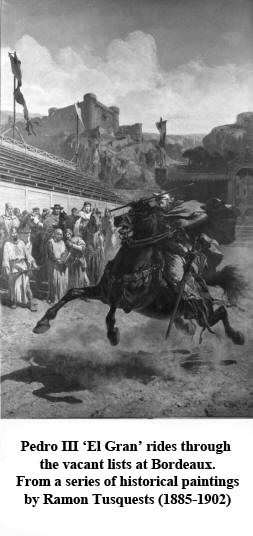One of the more curious
episodes of the war was a challenge to a duel issued by
Charles of Anjou
to Peter III
by which the entire issue of control of Sicily would be
decided. By February 1283 Charles had lost not only Sicily, but also most of Calabria.
In an attempt to rectify the situation, Charles, in full medieval style,
sent two Dominican monks with a letter to Pedro, accusing him of betraying God
and the Church, and challenging him to single combat in order to decide the conflict.
Peter III accepted the challenge and agreed to meet Charles at
Bordeaux on June 1st, but because Charles was already in his fifties, it
was agreed that one hundred knights from both sides would fight with their
kings. Undoubtedly advisors and allies on both sides were aghast that the entire issue would be
decided by the unpredictable outcome of a tournament. Edward I of England
was to come to Bordeaux to guarantee the safe conduct of Peter and his
retinue, but Pope Martin IV,
in an attempt to squash the whole affair before it
could take place, forbade Edward to attend and in any case he considered the
affair to be trivial. Despite
the misgivings of his advisors, Peter made preparations to go to France.
Before leaving Sicily, Peter took several steps to reorganize the Sicilian
government including the naming of John of Procida as Chancellor of the
island and replacing his natural son
James Perez,
who had been admiral of the fleet, with a Calabrian nobleman
Roger
of Lauria. On April 16th
Queen Constance arrived in Sicily with the two princes, James and
Frederick. Charles of Anjou had taken similar steps in February put things
in order prior to the duel when he named his son, Charles of Salerno, as
king of Sicily in January 1283.
and allies on both sides were aghast that the entire issue would be
decided by the unpredictable outcome of a tournament. Edward I of England
was to come to Bordeaux to guarantee the safe conduct of Peter and his
retinue, but Pope Martin IV,
in an attempt to squash the whole affair before it
could take place, forbade Edward to attend and in any case he considered the
affair to be trivial. Despite
the misgivings of his advisors, Peter made preparations to go to France.
Before leaving Sicily, Peter took several steps to reorganize the Sicilian
government including the naming of John of Procida as Chancellor of the
island and replacing his natural son
James Perez,
who had been admiral of the fleet, with a Calabrian nobleman
Roger
of Lauria. On April 16th
Queen Constance arrived in Sicily with the two princes, James and
Frederick. Charles of Anjou had taken similar steps in February put things
in order prior to the duel when he named his son, Charles of Salerno, as
king of Sicily in January 1283.
It is doubtful if either king intended to fight the duel. The chronicles suggest that the duel was simply a ruse to lure Peter into an area where Charles could seize him easily, and Peter's behavior indicates that he was aware of the situation. While Charles arrived in Bordeaux with much fanfare and more significantly with the king of France and a large retinue, Peter came unannounced with only the men required to enter the lists. Since the time of the duel had not been set, Peter arrived early at the gates of the city and sent for the seneschal of Bordeaux. When the seneschal arrived, Peter rode to the vacant tilting ground and announced that he had fulfilled his promise to appear in the lists, and that his opponent had failed to show thereby forfeiting the match to him. Peter apparently did not wait for Charles's response and left immediately for Fuenterrabía, the nearest border crossing back to Iberia.
While this rather bizarre episode between the two kings was being enacted, more serious events were unfolding in the Mediterranean.
Photograph of Peter El Gran at Bordeaux painting courtesy of the Institut Amatller d'Art Hispanic in Barcelona.


